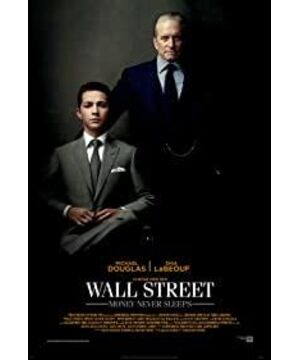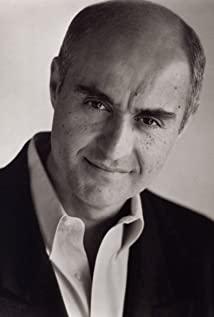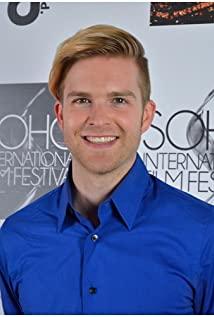Zhong Bei
in May this year, after Wall Street II: Money Never Sleep was released for the first time at the Cannes Film Festival in France, The location where the creators were interviewed was as follows: the boats drove along the long coastline for 30 minutes, and after landing, they came to a small village. With the warm sea breeze in the afternoon, the media from all over the world took turns talking to them.
Leaving the film festival, the location of the interview is a gorgeous hotel, luxurious and grand. A handsome guy in white gloves and a small round hat opens the door for you. The publicist waited outside the room, readying a delicate gray scarf for the arrival: "Wall Street: Money Never Sleeps."
In China, the media were pulled into small Fox conference rooms over the weekend. In a building in the most expensive part of the capital, they have their own office. In addition to the playback effect of the film - the film is divided into 7 small sections, and the screen is covered with logos to prevent piracy - it is a bit difficult, the process is happy and relaxed, and the big table is full of snacks and hot drinks.
As for the recession...
Forget it, please throw it on the back of your head.
All over the world, greed is still good today. After all the preparations and preparations are completed, we look forward to an interview with the controversial director Oliver Stone. Emotionally, it may be more of a revisit, relive a mood, atmosphere in "Wall Street" directed by him in 1987, and look forward to how those morally corrupt, mercenary, ruthless guys will continue in this new era Do bad things.
Oliver Stone has a ruthlessness in his bones, not only because of his most successful three bloody Vietnam War films, but also because he is good at digging out ruthless characters. Before "Wall Street" (1987), people thought that Michael? Douglas only had a talent for investing. Afterwards, his ambitious, ruthless corporate sniper side was revealed. Everyone knows that he is very good at acting and is good at provocative speeches:
"Greed...sorry I can't find a better word, greed is good. Greed is right. Greed is useful. Greed sheds light on everything, cuts through the woods and gets to the very essence of evolution. Greed exists in all forms - greed for life , greed for money, love, knowledge - greed inspires the upward motivation of human beings."
This speech is still a famous quote in film history, and the media often quote "greed is good" when reporting the financial crisis. Back then, as soon as Michael Douglas spoke the definition of "greed", the Oscar committee gave him a "Best Actor" statuette.
Oliver Stone, 64, looks so old that he can't laugh, or the wrinkles on his face make him look like a Shar Pei. It's better to be looser, and to look more reminiscent of a shaved Hemingway—mentally, both of whom have war hangovers—rather than the insatiable Wall Street guy.
But isn't it time for "greed" to return?
Gordon Gekko represents the recklessness and ambition of the American middle and upper classes before the 1987 stock market crash. Now he has been released from prison and returned to the rivers and lakes, writing his past experiences into a history textbook (the book is titled "Is Greed Is Good?" in the movie), standing on a high place and speaking to the pulpit in the same tone of 23 years ago. The crowd said: "It's all about 'money', young people, and the rest is just a digression."
Greed returned to
1986 after filming "Field Platoon", Oliver Stone decided to set the next film as Wall Street in the fierce battle zone of American business activities. In "Wall Street", Bud Fox is a young stockbroker who wants to make a breakthrough in the financial world, and this ambition is destroyed by Gordon Gekko. At the end, Gordon goes to jail.
"People like Gordon can't survive now. Those pirate characters are gone, replaced by financial institutions that used to do their jobs. Banks used to be banks, and insurance companies were insurance companies, but all that. It all changed in 2008. The financial opening in the 1980s and 1990s, the firewalls between these different functions collapsed one by one,” said Oliver Stone.
Wall Street in the real world is constantly changing, and Gordon has to keep pace with the times. Stone didn't have any plans for a sequel until he read screenwriter Allen Loeb's script for "Wall Street II: Money Never Sleeps" in 2009, and he was tempted to get Gordon Guy Ke's comeback:
In 2001, after 8 years in prison, Gordon came out. He returned to society with a heavy brick big brother and a gold medal that could not be spent as money. Outside the gate, a stretched limousine was parked there, but it was the releaser behind Gordon who came to pick it up. The former Wall Street tycoon had nothing at this time, his wife died, and his daughter Vinnie made a clear line with him. For Tycoon, everything in reality returns to zero.
The young investment manager Labev is Vinnie's boyfriend and a participant in history repeating itself. Working on Wall Street, there is still a trace of conscience and humanity. LaBeev's teacher is on the brink of bankruptcy in a man-made financial turmoil, and the rules of the Wall Street game push the well-dressed old gentleman into the wheels of a subway train. For revenge, LaBeef and Gordon allied themselves. The latter, using the former to get back a large sum of money in his daughter's name... At this moment, no one will object that Oliver Stone is a fanatical believer in conspiracy theories. Moreover, props to support conspiracy theories are expensive enough to use the parent-daughter relationship.
But 23 years later, both Stone and Douglas are fathers of several children. They are old and old, and finally know how to leave a way out for themselves in a radical, angry reality, and leave a few Hollywood-style bubbles of hope for the world, even if the bubble is burst.
In an instant, Oliver Stone was on the opposite side of the American Dream, and Gordon was no longer the bloodthirsty man who thought he shouldn't eat lunch. In front of his tearful daughter who needs to say a few lines, the world's first issued stock is framed in Gordon's house, but in the dead of night, he is not staring at the trend chart, data sheet, financial report and various inquiries. The company's gossip, but the B-ultrasound image of the grandson's heartbeat!
It wasn't Spider-Man, The Phantasm, Green Lantern, Superman, Gorilla King Kong, Shrek, who saved Wall Street. Sitting across the table from LaBeev, talking about injecting capital into new energy projects is a Chinese businessman. Chinese real estate tycoon Pan Shiyi, Mr. Pan's wife, Mr. Zhang Xin, Mr. Zhang, was the secretary next to the negotiator. A few scenes flashed, and she had two lines. It is said that Oliver Stone and President Zhang have a good personal relationship.
"The influence of the Chinese on Wall Street in the film is real, and there are two or three places in the film. In reality, Chinese money plays a very important role in Wall Street, and a lot of money is operating." Oliver Stone said . In reality, the role of Chinese money in Hollywood, why not... The
ending is very good, Vinnie and her boyfriend and Gordon reconciled. On the street, three adults embraced their unborn child.
"I guess I can explore cynical thinking, I'm interested in thinking like that, and it's interesting to everyone. But I don't encourage such a way of life, I guess the final question is to choose love or succumb to Greed? Meeting society's expectations, or meeting your personal needs? I think that's the main issue of the movie. Gordon Gekko is a social winner in the first film. In the second film, he is The loser in society is the opposite of the American dream," said Oliver Stone.
Audiences, especially those who have worked on Wall Street, guess that Stanley Weiser, the screenwriter of "Wall Street" 23 years ago, "must have experienced the hardships of the sell side of investment banks on Wall Street, and must have seen the domineering and domineering of the buy side." , so the whole film is believable.” Oliver Stone wrote "Greed is Good" based on his experience with his father who worked on Wall Street for 24 years.
And 23 years later, even with Buffett making a cameo in person, the most touching thing is "the re-appearance of the old lady who sold the house", she made people feel that "23 years can really pass in a flash". There are some misunderstandings - Gordon Gekko's movie sequel to his life on Wall Street is actually a warm family drama.
He's not a soft-footed shrimp
If you think Oliver Stone is a soft-footed shrimp because of all the family and tears that make the movie's selling point, you'd be wrong. Of course, he's still not Gordon Gekko, he eats lunch, and he eats breakfast and dinner.
On September 15, 1946, Oliver Stone was born in New York, USA. He was deeply influenced by Buñuel and Godard when he was a teenager. His family and his own early life also became the main source of his later filming and filming. theme.
Later, he went to study at Yale University, wandered around the campus for a year, and then went to teach in Vietnam. This is his first exposure to the world outside the United States. After all, the teaching life was peaceful. When he came to Vietnam for the second time as a soldier in 1967, the feeling was subversive. What he saw were bullets flying, mutilated bodies and life wounds that could not be healed by those who had witnessed it.
In fact, my father wanted Oliver Stone to follow his father's business to work on Wall Street. But unfortunately, his math is really bad. I read 3 books very hard, and finally figured out that I couldn't understand those things at all. Stone gave up.
He learned to make movies with Martin Scorsese. Step into the film industry as a photographer and do some editing and editing work. While studying at NYU, he made three black and white short films ("Last Year in Vietnam", "Madman of Martinique" and "Michael & Marie").
He later got married and had to drive a taxi to support his family. Holding the steering wheel, he was thinking about how to change the 28th draft movie script when he got home at night, and who should he ask to put some money into his book. A good-hearted person finally appeared. Although it was a film company that was about to go bankrupt, it finally wrote and directed the film Epilepsy (1971).
What hurt the most was the Vietnam War, the killings, and the faces of those desperate women, and he took advantage of his memory to write them down. In 1976, when the marriage was coming to an end, Oliver Stone wrote the script for Field Platoon. But he was too ordinary and used up his earlier good fortune, and no studio would pay for his script.
Like all perseverance and inspirational protagonists, Oliver Stone didn't give up writing the script, and even moved from New York to Los Angeles. Columbia Pictures gave him the perfect opportunity to rewrite the script for "Midnight Express." It's a crazy story that ended Stone's obscurity and ignited Stone's little rocket in Hollywood's Vanity Fair -- 1978's Midnight Express earned him an Oscar for Best Adapted Screenplay.
It was almost 10 years after the script was finished that "Field Platoon" began filming in the jungles of the Philippines.
He couldn't forget the Vietnam battlefield, the killing, the faces of the women in his mind, all kinds of images were put into the movie, "Field Platoon", "Born on the Fourth of July" and "Heaven and Earth" are Oliver Stone's "Vietnam War Trilogy": During the
chat, the speaker is missing an arm, but the smile is still there. The most savage killings do not exist between Vietnam and the United States, but the internal friction between comrades-in-arms and the carnage among comrades-in-arms. ("Field Platoon", 1986).
Private Kovek came home from the Vietnam battlefield, paralyzed, still has faith in the country, and even scolded his sympathetic brother for being unpatriotic. But in the end he broke down, woke up, and scolded endlessly at the presidential campaign site in a wheelchair. "War is the devil, it's your hypocrisy!" ("Born on the Fourth of July", 1989)
In a peaceful village in Vietnam in the 1950s, war destroyed the lives of the villagers. Lily married GI and had 2 sons. The family returned to the United States and integrated into the local society. Unable to bear the pressure of spirit and life, the soldier ended his life. "Different skin color, same sorrow," he said to Lily. ("Heaven and Earth," 1993)
The trilogy earned Oliver Stone fame and glory. "Field Platoon" and "Born on the Fourth of July" both won Best Director Oscars that year.
Portraits of presidents
seem to interest Oliver Stone from all the taboo subjects, such as "Natural Born Killers" (1994), where you kill your parents and kill passersby.
But to Stone, it's nothing. On September 7 last year, "South of the Border" (South of the Border), which was screened at the Venice Film Festival, surprised many people. The protagonist of the film is Venezuelan President Chávez, considered by some to be "the number one open enemy of the United States".
For the filming of this film, Stone visited Venezuela many times, had long conversations with Chavez, attended the meeting he chaired, and interviewed Chavez's friends, Brazilian President Lula, Bolivian President Morales, and Argentine President Christie. Na and her husband, former President Kirch Nell, Paraguay President Lugo...
Through the interview, he hopes to explain to the audience: Chavez is not the number one enemy of the United States, but a believer of Bolivar. He dreams of a united and liberated Latin America. A strong and thorough champion of change in the Americas".
"I like Chavez, he's warm, polite, although physically he's like a bear. I always say if he looked like Woody Allen, he would have a much better relationship with the world's media. I think people Fearing him because of his size," Oliver Stone told The Guardian reporter Carole Cadwalladr.
In a sympathetic interaction, Chavez stood on the dark runway, pointed to a building, and said to Stone: "There was a coup and I was stuck there, and some of my men died in that building. Then Stone replies, "As a veteran, I understand." Then they put their hands on each other's shoulders.
A picture of Fidel Castro, the man he admires, hangs on the walls of Stone's house. In The Commander (2003) and its sequel, Finding Fidel, Castro was portrayed as a Cuban hero against the United States. Hero biographies are banned in the United States.
He also made documentaries for the presidents of his country, such as George W. Bush. "Frankly, it's hard to deal with Bush Jr., he's a hard person to talk to. We've seen people like this in movies: when you look him in the eyes, he's going to run away from the statement. What does he answer, It's a polite timidity to ignore anything. Listening to him is like listening to an alcoholic tell you he believes in Jesus. In the mid-1960s, Bush and I went to Yale University at the same time as classmates. Actually, Bush Jr. and I I didn't read it. I dropped out of school to go to Vietnam to fight in Vietnam, and he was an ignorant dude. This movie is about Bush when he was 21 until he became president."
Recently, Oliver S. I fell in love with Iranian President Mahmoud Ahmadinejad. He thought it was an excellent biography subject, even more thrilling than the story of Wall Street!
MW: Why did you shoot the "Wall Street" series, in order to make money?
OS: Wall Street in 1987, I shot it as a moral allegory, but a lot of people misread it. I didn't expect Gordon to be so popular, he became such an iconic character, this movie has really created a culture on Wall Street, in terms of behavior and dress, it has a certain impact on Wall Street, Gordon even Becoming an enduring figure in American culture, many on Wall Street not only wore Gordon's haircut, imitated his clothes, but acted according to his style. A lot of people even came to me and said, "I went to Wall Street to work because I saw your movie". There are also many realistic factors in the filming of "Wall Street: Money Never Sleeps". Since the 1990s, the speed of people's accumulation of wealth has been soaring, millions have become billions, and the greedy Gordon has also been greedy. Banks were completely devastated. By 2008, people like Gordon could no longer survive, and were replaced by financial institutions that used to abide by their duties in the past. The firewall in between collapsed. The idea of making a new "Wall Street" with a comeback of the characters didn't come to me until I read the script written by screenwriter Aaron Loeb for "Wall Street: Money Never Sleeps" in 2009. Aaron Loeb has experience in the financial world. He condensed Wall Street and the global economy in 2008 into a script that made me decide to take over again? "Wall Street: Money Never Sleeps" is a reckoning of these past events. .
MW: We know your father worked on Wall Street. Did it help you direct a movie? What did you learn from your father's work experience on Wall Street?
OS: My father worked on Wall Street from 1931 on and off until 1985. He loves watching movies and once said, "Why don't they make a good movie about business," which has always been a challenge for me. After Platoon, I was able to do whatever I wanted, so I wanted to make a film about business. Commercial movies had disappeared from all genres of movies at the time, and Wall Street did bring financial awareness back out, and the movie was very sexy at the time, because it was the 1980s when money made people look sexy . The biggest difference between the 1980s and the last decade is that 2008 was the retribution for what the financial industry did in the 1980s. There was a huge credit bubble at the time, not-so-money deals were rife, and people were spoiled and living lives they couldn't actually afford.
MW: Do you think your father would be surprised by what's happening on Wall Street right now?
OS: I think so. Dad was a stockbroker in the 1930s and 1960s. If you can earn 100,000 yuan a year at that time, that year is very extraordinary. By the 1980s, the financial culture got out of hand, and although I thought it should end, that financial culture continued into the 1980s, 1990s, and even the new millennium, with inflation. Suddenly, millionaires became billionaires, and people started talking business in the billions. A billion equals a thousand million, which is an incredible number. Forbes magazine even had such a cover in 2007: "America's 1,000 Richest Billionaires". If Dad found out, he would have jumped out of the grave. It was too much.
MW: Did it excite or challenge you to shoot about Wall Street again?
OS: The issues on Wall Street in the 21st century are far more complex than those on Wall Street in the 1980s, and it's difficult to get back to that theme. I had to do a lot of homework on the subject of financial securities markets with Aaron Loeb and Stephen Schiffer, two of my playwrights. Perhaps the hardest part of making this film was that we had to combine the complexity of finance with the kind of manipulative and intense narrative that was needed throughout the film. The subject we choose to describe this time is the same as the one we chose in 1987, which is about the relationship between people, especially love, trust, greed and betrayal.
I see this story as the story of 6 people who live in a special area of New York, are intertwined in many ways, one betrays the other for self-interest or other motives. But on the other hand, several of them made the right choice in the end, but it was very surprising.
MW: The "Wall Street" series is now so successful at the box office, did you expect it at the time?
OS: No, but I'm very proud of this movie. Michael Douglas played it well and has become an iconic character. A lot of young people at the time told me they got into Wall Street because of this movie, and now they're middle-aged and billionaires, it's amazing, I'm still here struggling to make a living making movies, those millionaires running Come and say to me, 'I wouldn't be on Wall Street if it wasn't for your movie,' which is ironic, but I think it's funny. My pressure is just worrying about whether the 2nd part will live up to people's expectations, but we'll do our best to make a good sequel.
MW: We've been looking forward to this movie since last year. But the premiere date was pushed back from February to April 23, and then to October. Rumor has it that the premiere day has been delayed repeatedly in preparation for next year's Oscars. Is that right? If not, what is the reason?
OS: The premiere date was never set for February. We only finished shooting last December, and we can only paint on April 23rd at the earliest. We moved the date back because we were invited to the Cannes Film Festival in May, which is a great international stage for movies. These crucial weeks gave me more time to make the film more rhythmic and detailed. Turns out I made more changes to the film over the summer after the Cannes film, but I'm happy with the results. October is always the best time to premiere. The Oscars come every year, but I think getting a world platform and box office results is the most important thing for us. I don't really expect anything from Oscar.
MW: Over the years your films have had a strong social conscience. Do you think movies have the power to change society?
OS: I don't know if movies are okay. I've made 3 films about Vietnam, but it didn't affect our social conscience, and now we're still stuck in the quagmire of war, fighting Panama, Iraq, Afghanistan, and it's very bellicose. My films "Nixon" and "W." remind people of what kind of person can be president. People pay more attention to "now" than "history" these days. The media responsible for popular opinion also make the same mistake, they spend a lot of money chasing fresh news, today's, this week's, but long-term follow-up reports are gradually disappearing. That's one of the reasons I've spent a lot of time making "The Untold History of America," a 12-hour, 12-episode film that's coming out next year.
To a certain extent, the film will make young people look at the interaction between the government and citizens from a new perspective and question authority, which is good. But I have doubts about whether movies can bring about substantial changes, so I don't have high expectations for this. I want to be a filmmaker who can make good movies and entertain the public. Others, I take it lightly.
"Weekend Illustrated"
View more about Wall Street: Money Never Sleeps reviews











